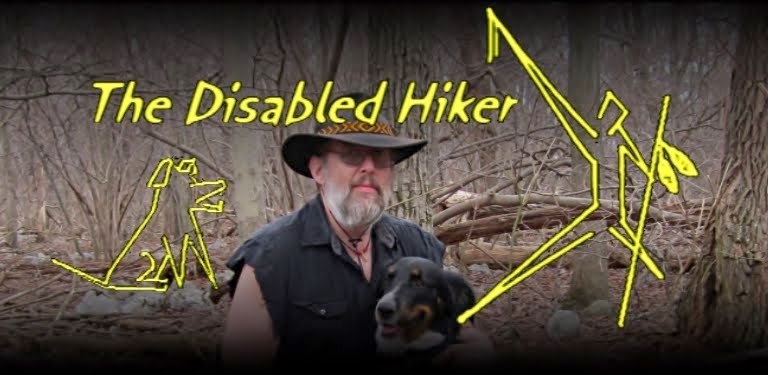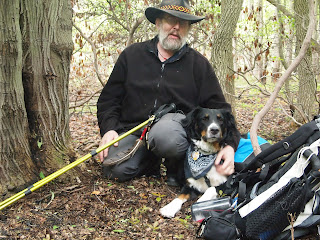Putting aside the obvious approval of my hiking companion TaSunka, if I had to choose one tool that was pivotal in allowing me to continue my adventures, I would have to say it is the walking stick, and more specifically, today's trekking poles. After my lung surgery, I began to use a single walking stick whenever I would hike or backpack. I had noticed other hikers using two walking sticks but always figured it would be more of a hindrance than a help. Until I tried it that is.
On one particular outing, a friend had asked me to hold his walking stick while he ducked behind a tree to relieve himself. I agreed and told him I would walk up the trail a few yards and wait for him.
The second I put the pair of sticks to work as a third and fourth leg, the advantages became instantly clear. Suddenly I went from feeling like the typical biped to feeling like some giant four-legged spider, stretching its long front legs out to test the environment around him.
The second I put the pair of sticks to work as a third and fourth leg, the advantages became instantly clear. Suddenly I went from feeling like the typical biped to feeling like some giant four-legged spider, stretching its long front legs out to test the environment around him.
I was amazed at the stability and the quickness at which I could recover
when I stumbled even though I was not putting my full weight on any one of the hiking sticks. I felt myself using all four of my limbs instead of only the two that lie beneath my torso. And although was a silly thought, I felt like I could go anywhere.
Before I knew it, I had walked several hundred yards while experimenting and testing out my new found legs, leaving my hiking companion far behind. I found myself very disappointed when the first thing he asked for after catching up to me was his hiking stick back. From that moment on I knew exactly what I had to do. Find my own fourth leg.
Using one hiking stick always felt somewhat like I was using a crotch or a cane. But somehow using two walking sticks suddenly elevated me to the status of quadruped instead. I had to ask myself, how did this occur. How did using two walking sticks turn a crotch into an extra set of legs?
As the Internet was not such a big thing in those days, I set about doing my own research on the physics behind the single vs. double walking stick, question. I started calling it the three-legged dog theory, as I noticed that dogs who had lost the use of one front leg exhibited the same lopsidedness to their gate as I had using only one walking stick.
Another thing that became apparent was that I was doing myself no favors in the balanced department and adding significantly to the amount of pain I would have to deal with during and after my hike. Like a three-legged dog, that small amount of forward weight transfers to the ground like the front leg of a dog supports its forward weight.
Granted, the dogs forward weight is much greater than a bipedal backpacker puts on his walking stick. But we are talking about forces significant enough to notice right off, especially when that weight is ill
 |
| TaSunka comforts our lil Chante after a bad fall. Jan, 2015 |
From that time on, the use of two trekking poles soon became a staple on all my expeditions. So when Outdoor Products agreed to send me their Apex Trekking Poles for review, I could hardly wait to hit the trail with them. But I must admit to a few reservations. Mainly because as most humans are, I am a creature of habit.
Previously, I had always relied on one solid wooden hiking stick for my right and stronger side, and paired it with a collapsible trekking pole that I used for my left and weaker side. I had found that particular trekking pole back in the 90s after I had my three-legged dog epiphany. But my recent research found it would cost me nearly $180 (three times the original's cost) to purchase a matching pole.
I always had it in my mind that the heavier wooden walking stick could support my weight better should I fall. However even early on it was apparent that this logic was inherently flawed as it relied heavily on me only falling 50% of the time and only when the right walking stick was touching the ground.
Despite this flawed logic, I felt true apprehension when first putting aside that heavy wooden walking stick. Replacing both of my trusted walking sticks for the incredibly lightweight and matched set of Apex Trekking Poles, seemed almost wrong somehow. What if they weren't strong enough? Falling is a major fear for me out there, and reliable equipment is always a great concern to me.
Deciding to take them out on a few day hikes to build confidence, the Apex trekking poles did not disappoint. The benefits of using two well matched and lightweight trekking poles over the heavier unmatched set became instantly apparent. Stumbling over the uneven ground, I instantly became aware of how much faster the reaction time was over the older and heavier set.
I've always kept a sort of priority list in my head of the items that I felt I should spend the most money on when it came to equipment. Knowing full well how many wooden walking sticks I had broken within those three-legged dog years, I realize that replacements were not only inevitable, but
 |
| Two of my old walking sticks gluing back together for display |
So it was pretty clear I was going to have to look at this product through a different set of expectations. i.e.: as a valued, trusted, rugged, yet easily replaceable piece of equipment.
Despite my initial skepticism, I must award the Apex Trekking Poles by Outdoor Products with a full complement of five stars.
Well done Outdoor Products. For not only making a product we can rely on, but that we can also afford as well.
Take a look at what I found.
SPEC'S
~ Carry weight – 0.74 lbs. each/or 1.48 lbs.
~ Products Weight capacity – NOTE, product not meant to bear full weight of user.
~ Length – collapsed min: 26 inches, extends to a max: 53 inches
1. Initial appearance and impressions upon delivery –
* Appears to be in perfect condition and all moving parts functioning.
* Love the little grass boots for the tips.
2. Comparative price –
* The price is very reasonable when compared to other trekking polls of similar design and strength.
* In fact, the retail price was low enough where I actually considered purchasing a extra set in anticipation of the inevitable need for replacements. (Pennsylvania is extremely rough on trekking poles and walking sticks.)
3. How easy is the product to set up and use? –
* Set up was easy, again when compared to other trekking poles of similar design.
* NOTE; I would highly recommend that those with arthritis or dexterity issues in the hands get help adjusting, locking, and periodically checking the twist locks before setting out. [See number 8 for a great work-around idea]
4. Product Pros –
* Regardless of the condition or disability, the stability and dependability of our trekking poles is an absolute necessity. However, creating that while maintaining a reasonable price for the consumer, including those on a low or fixed income is a beautiful and all American thing to do. (Hats off to Outdoor Products on this one)
* The three different types of tips, two of which came separately with the Apex Trekking Poles, help to maneuver through a wider variety of ground textures. Nice touch.
ribs on the back of the handle were adequately designed to help keep the palm of the hand cool as well.
5. Product Cons –
* As I tend to use the straps on a trekking pole to help give my hands a break, I did notice a buckle on the strap slipping the more I relied on the strap. However I realize that this was due to the newness of the material and as the strap aged the buckle easily bit into the material.
* I could find no medical concerns with the Apex Trekking Poles, save one. And PLEASE NOTE, it is inherent of all collapsible trekking poles.
As Clearly Stated in the Manufacturers Instructions; it is your responsibility to make sure that all parts are securely locked into position before taking that first step. So PLEASE do not take this warning lightly.
I cannot over-stress the importance of inspecting all collapsible trekking poles from top to bottom, collapsible joints and straps, not only before starting out, but after each and every break along the way as well.
A loose telescoping joint could lead to an unexpected and catastrophic failure of the trekking pole and the possibility of a serious injury from the resulting fall. So please note that you inspect your trekking poles often and confirm all joints are tightened securely.
7. Medical benefits of the product –
* Adds stability, balance, as well as supporting posture, all of which culminates in added safety and unexpected enhancements of speed as well.
* The above enhancements to stability and balance, etc., help to create a renewed sense of independence for the disabled. Especially when in a wilderness setting.
8. Clinical Observation & Innovations–
* Arthritis/hand & arm pain Note; You might consider carrying a pair of jar lid grippers in your pocket (i.e.; the flat pieces of rubber used for opening jars around the kitchen) in order to get a more secure grip and twisting motion when locking the trekking pole joints.
* Will I be hanging up my wooden walking stick for good now?
I don't know. For the moment, I am intrigued and swept up in the lightweight trekking pole movement. But as I stated previously, I'm a creature of habit. So only time will tell what new habits I'll form, and what habits I returned to.
But in the meantime, just as I'm sure you will, I'm enjoying the Apex trekking poles and making every mile count.
Till next time, happy hiking.
~ The Disabled Hiker ~
Apex Trekking Pole review
by Terry Craig -The Disabled Hiker ©2015
Photos by:
Larry Deitch,
Dawn & Terry Craig
Photos by:
Larry Deitch,
Dawn & Terry Craig
Does
your company make a piece of backpacking or hiking equipment that you
feel would help the physically challenged to enjoy the wilderness with
more confidence and ease? If so, I would love to review your product for
my audience. We all deserve a little piece of the wilderness, and The
Disabled Hiker is committed to helping everyone find that peace and
tranquility that only the woods can provide. If you would like to help,
please e-mail me, Terry Craig - The Disabled Hiker, at thedisabledhiker@gmail.com
Check out these other great links from THE DISABLED HIKER.
The Disabled Hiker on YouTube
The Disabled Hiker on G+
The Disabled Hiker on FaceBook
The Disabled Hiker on Twitter
https://twitter.com/TheDisabledHike
The Disabled Hiker on Instagram
https://instagram.com/the_disabled_hiker/
The Disabled Hiker on Instagram
https://instagram.com/the_disabled_hiker/
The Disabled Hiker on Pinterest
Terry Craig on YouTube
The Disabled Hiker on ReverbNation (music)
http://www.reverbnation.com/terrycraig?profile_view_source=header_icon_nav
The Disabled Hiker on SoundCloud (music)
https://soundcloud.com/terry-craig-2
http://www.reverbnation.com/terrycraig?profile_view_source=header_icon_nav
The Disabled Hiker on SoundCloud (music)
https://soundcloud.com/terry-craig-2










